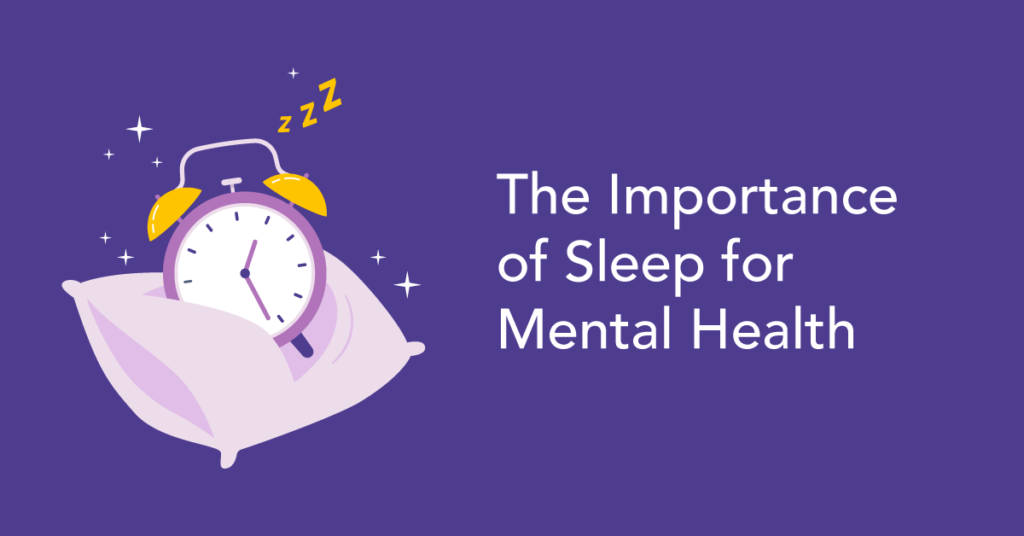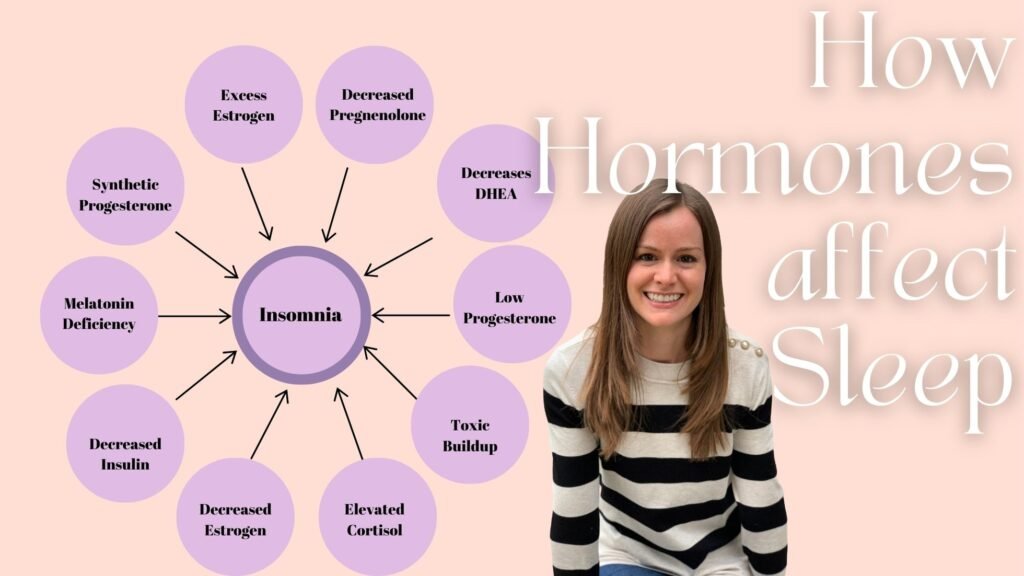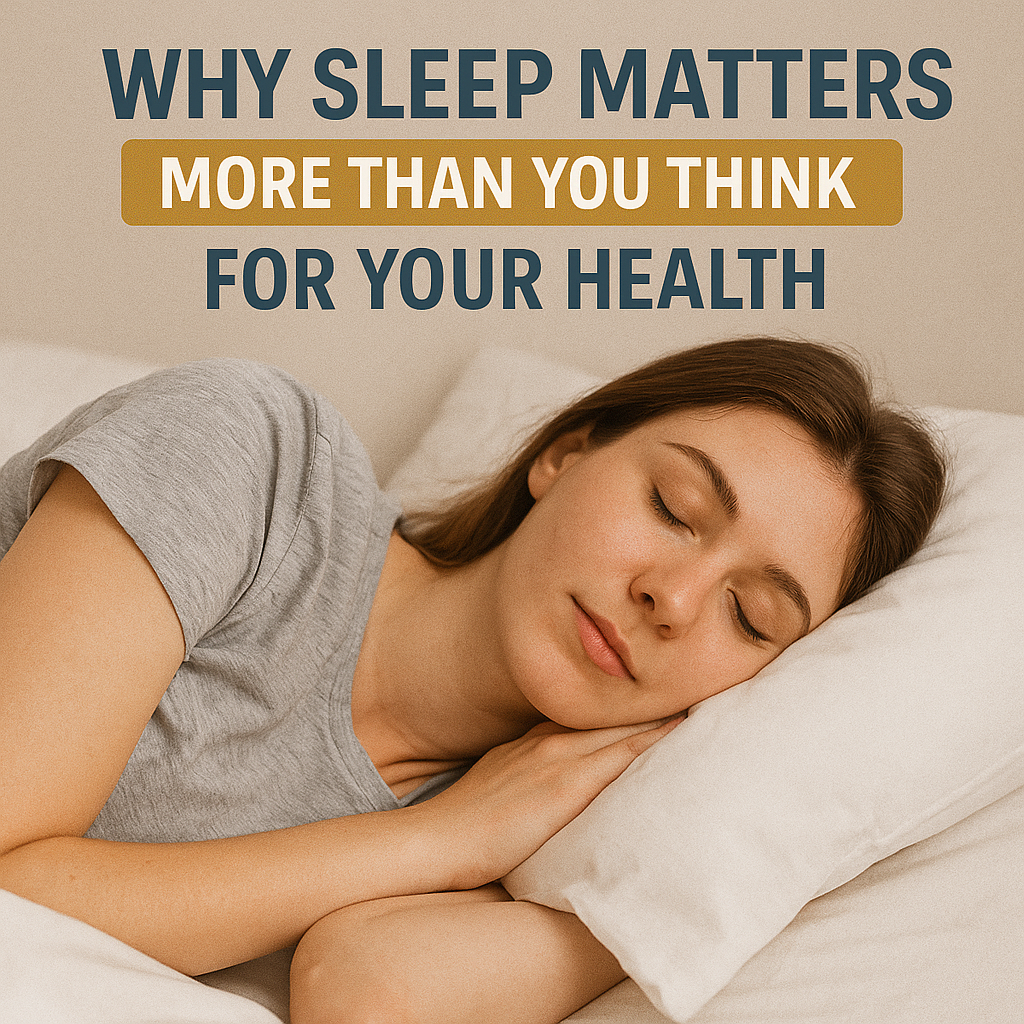Table of Contents
Why Sleep Matters for Your Health?
We’ve all heard the saying, “Sleep is important,” but how often do we truly understand why it matters so much for our health? Sleep is one of the most essential functions our body performs daily, yet it is often the most overlooked aspect of well-being. The truth is, sleep is a critical pillar of overall health, with direct impacts on mental clarity, physical vitality, hormone regulation, and even mood. When we neglect proper rest, it’s not just our energy levels that suffer—our hormones, weight, and cognitive functions can take a hit as well. Understanding the science behind sleep and how it affects our body can empower us to prioritize sleep hygiene and improve overall health.
In this article, we will dive deep into the significance of quality sleep, the consequences of sleep deprivation, and practical ways to enhance your sleep hygiene for better physical and mental well-being.
The Importance of Quality Sleep

How Sleep Affects Mental Health
Sleep plays a pivotal role in the health of our brain. While we sleep, our body is hard at work, repairing and rejuvenating brain cells, organizing memories, and processing emotions. Insufficient or poor-quality sleep has been linked to an increase in mental health problems like anxiety, depression, and cognitive decline.
When you get a good night’s sleep, the brain goes through various stages of rest, including deep sleep and REM (Rapid Eye Movement). These stages are crucial for memory consolidation, emotional regulation, and overall brain health. On the flip side, lack of sleep can leave you feeling foggy, irritable, and unable to focus, which can lead to chronic stress, further exacerbating mental health issues.
Proven Sleep & Mental Health Link:
- According to research from the National Institute of Mental Health (NIMH), people suffering from mental disorders often experience sleep disturbances, and vice versa. Source: NIMH
Additionally, women are particularly prone to mental health challenges related to sleep. The intersection of sleep deprivation and hormonal fluctuations can amplify anxiety and depression symptoms, creating a vicious cycle. You can read more on this in our article about mental health in women and its relationship with anxiety. Learn more about anxiety in women here.
The Impact on Physical Health

While we sleep, our bodies aren’t just resting—they’re recovering. Sleep is when our immune system strengthens, tissues repair, and muscles regenerate. The growth hormone, which plays a role in tissue growth and muscle repair, is released during deep sleep. Adequate sleep ensures that all your bodily systems are functioning optimally, including your cardiovascular system, metabolism, and immune response.
Sleep also directly affects weight. Poor sleep leads to the dysregulation of hormones such as ghrelin and leptin, which control hunger. When you’re sleep-deprived, you might feel hungrier, which often results in overeating and weight gain.
Scientific Insights:
- A study conducted by the Sleep Research Society showed that individuals who sleep fewer than 6 hours per night are more likely to gain weight due to hormonal imbalances. Source: Sleep Research Society
The Science Behind Sleep Deprivation

Hormonal Imbalances Due to Lack of Sleep
Your body has intricate mechanisms that regulate hormones, many of which are directly impacted by sleep. When you skimp on sleep, the balance of these hormones can be disrupted, leading to a range of health issues:
- Cortisol (Stress Hormone): Chronic sleep deprivation can lead to higher levels of cortisol, the stress hormone, which can cause increased stress, inflammation, and anxiety.
- Leptin and Ghrelin: As mentioned, these hormones regulate hunger and appetite. Lack of sleep leads to higher ghrelin (hunger) levels and lower leptin (satiety) levels, resulting in overeating.
- Insulin: Sleep deprivation can make your body more resistant to insulin, raising blood sugar levels and increasing your risk of developing Type 2 diabetes.
Understanding how sleep impacts these hormones can help you see why getting enough rest is essential for maintaining a healthy balance in your body.
Effects of Sleep Deprivation on Weight

There is a well-documented link between poor sleep and weight gain. Lack of sleep triggers cravings for high-calorie, unhealthy foods and makes it harder for your body to metabolize glucose efficiently. It also affects your body’s ability to burn fat. Over time, this combination of factors can result in an increase in body fat and a higher risk of obesity-related diseases.
Important Studies:
- The American Academy of Sleep Medicine links sleep deprivation with an increase in body mass index (BMI) and weight gain, as the body’s energy regulation system becomes unbalanced. Source: AASM
How Lack of Sleep Affects Your Mood
In addition to physical and mental health concerns, sleep deprivation also significantly affects your mood. If you’ve ever had a bad night’s sleep and found yourself snapping at others or feeling emotionally fragile the next day, you’ve experienced this firsthand.
Sleep & Mood Connection:
- Sleep impacts areas of the brain that control emotions, including the amygdala, which is involved in emotional responses. When you’re sleep-deprived, your emotional responses become more exaggerated. Research shows that chronic sleep deprivation can increase your risk of depression and anxiety, with studies indicating that individuals with insomnia are ten times more likely to develop depression.
Sleep is often underestimated in our fast-paced, always-connected world. Many people treat it as optional—something to cut back on to make time for work, entertainment, or social obligations. But science continues to prove what our bodies already know: sleep is not a luxury; it is a biological necessity. If you’re skimping on sleep, you’re risking your physical health, mental well-being, and long-term quality of life.
In this in-depth guide, we’ll uncover why sleep is far more critical than most people realize, the hidden dangers of sleep deprivation, and what you can do to improve your sleep starting tonight.
Sleep: The Body’s Ultimate Reset Button
Sleep isn’t just rest—it’s an active, complex biological process that supports nearly every system in the human body. During sleep, your body heals, regenerates, balances hormones, strengthens your immune system, and consolidates memories.
There are four sleep stages: light sleep, deep sleep, and two stages of REM (rapid eye movement). Each stage plays a role in overall restoration. Deep sleep repairs muscle tissue and strengthens the immune system, while REM sleep supports learning, memory, and emotional processing.
Missing out on these stages robs your body of the time it needs to heal, regenerate, and prepare for another day.
The Real-Life Consequences of Poor Sleep
Many people assume they can get by on 5–6 hours of sleep. But chronic sleep deprivation—even by just one or two hours—can dramatically affect your health. It’s not just about feeling groggy; it’s about what’s happening beneath the surface.
1. Weight Gain and Metabolic Dysfunction
Lack of sleep messes with the hormones ghrelin and leptin, which regulate hunger and fullness. Sleep-deprived individuals often feel hungrier and crave high-carb, high-fat foods.
It also interferes with insulin sensitivity, increasing your risk for type 2 diabetes and obesity. Studies show that sleeping less than 6 hours a night increases the risk of weight gain by 30% or more.
2. Weakened Immune System
Your body produces immune-boosting substances like cytokines during sleep. Without enough rest, your immune system can’t function at full strength, leaving you more susceptible to infections, colds, and even longer-term illnesses.
3. Mental Health Struggles
Sleep deprivation contributes to increased levels of stress, anxiety, depression, and even suicidal thoughts. REM sleep plays a crucial role in emotional regulation, so missing it leads to increased irritability, emotional instability, and cognitive difficulties.
4. Reduced Brain Function
Poor sleep impairs memory consolidation, focus, decision-making, and creativity. Even one night of poor sleep can reduce cognitive performance as much as being intoxicated. Over time, this can affect academic performance, job productivity, and safety.
5. Increased Risk of Chronic Diseases
Long-term sleep deprivation is linked to several chronic conditions, including:
- Cardiovascular disease
- High blood pressure
- Stroke
- Alzheimer’s and dementia
The body’s repair systems work primarily during sleep, so skipping it regularly can wear out vital systems prematurely.
Why Modern Life Is Stealing Your Sleep
We live in an era where sleep often takes a back seat to productivity, entertainment, and digital engagement. Several modern lifestyle factors are now major disruptors of healthy sleep.
1. Screens and Blue Light Exposure
Using phones, laptops, and TVs before bed exposes your eyes to blue light, which suppresses melatonin, the hormone responsible for sleep regulation. This makes it harder to fall asleep and stay asleep.
2. Irregular Sleep Schedules
Late nights, shift work, and inconsistent bedtimes confuse your body’s circadian rhythm, making it difficult to maintain restful, quality sleep.
3. Stress and Overstimulation
Constant mental stimulation and stress keep your nervous system in overdrive, delaying sleep onset and reducing deep sleep.
4. Caffeine and Alcohol Use
Caffeine late in the day disrupts sleep latency (the time it takes to fall asleep), while alcohol—even though it may help you doze off—reduces sleep quality and increases nighttime awakenings.
How Much Sleep Do You Really Need?
The National Sleep Foundation recommends the following:
| Age Group | Recommended Sleep |
|---|---|
| Adults (18–64) | 7–9 hours |
| Teenagers (14–17) | 8–10 hours |
| Children (6–13) | 9–11 hours |
| Seniors (65+) | 7–8 hours |
The key isn’t just quantity but also quality. Interrupted or restless sleep can still leave you feeling tired even if you log 8 hours.
Signs You’re Not Getting Enough Sleep
You may be sleep-deprived without even realizing it. Some common red flags include:
- Needing caffeine first thing every morning
- Midday crashes
- Trouble concentrating
- Forgetfulness
- Mood swings or irritability
- Difficulty waking up
- Falling asleep during daytime activities
The Long-Term Cost of Sleep Debt
Sleep debt accumulates over time. You can’t fully “catch up” on sleep by sleeping in on weekends. While it may offer some relief, consistent poor sleep builds up wear and tear on your body that can’t be reversed in just a few days.
Chronic sleep debt has been linked to:
- Premature aging
- Hormonal imbalance
- Poor fertility
- Reduced athletic performance
- Mental burnout
- Decreased life expectancy
A study from the University of Warwick found that people who sleep less than six hours a night on a consistent basis have a 13% higher risk of early death.
Practical Steps to Improve Your Sleep
You can start improving your sleep tonight with these evidence-based strategies:
1. Create a Sleep Routine
Go to bed and wake up at the same time every day, even on weekends. This trains your body’s internal clock for better rest.
2. Make Your Bedroom a Sleep Sanctuary
- Keep it cool, dark, and quiet.
- Use blackout curtains or a sleep mask.
- Invest in a comfortable mattress and pillow.
- Eliminate noise or use white noise machines.
3. Limit Screen Time Before Bed
Turn off screens 1–2 hours before bedtime. If needed, use blue light-blocking glasses or apps like f.lux.
4. Avoid Heavy Meals, Alcohol, and Caffeine Late in the Day
These substances can delay sleep and reduce sleep quality.
5. Try Relaxation Techniques
Deep breathing, meditation, light stretching, and journaling can help quiet your mind and prepare your body for rest.
6. Get Natural Sunlight Exposure
Morning sunlight helps regulate melatonin production and keeps your circadian rhythm in balance.
7. Exercise Regularly
Just 30 minutes of moderate exercise a few times a week can help you fall asleep faster and sleep more deeply.
Why Sleep Deserves Top Priority in Your Health Plan
Sleep is as vital as nutrition, exercise, and hydration. Yet it’s often the most neglected pillar of health. Optimizing your sleep improves your mood, brain function, heart health, immune system, metabolism, and more.
You don’t need fancy supplements or high-tech gadgets—just consistency and the willingness to prioritize rest.
Remember: no amount of productivity or late-night scrolling is worth sacrificing your health. A good night’s sleep may just be the most powerful medicine you’re not taking.
Sleep Hygiene: The Key to Better Health
If you’re struggling with poor sleep, the good news is that there are several ways to improve your sleep hygiene and quality. Sleep hygiene refers to habits and practices that promote better sleep quality. Here are some effective ways to improve your sleep hygiene:
1. Establish a Consistent Sleep Schedule
One of the most effective ways to regulate your body’s internal clock is by going to bed and waking up at the same time every day, even on weekends. This helps to reinforce a natural sleep-wake cycle, making it easier to fall asleep and wake up at the desired times.
2. Create a Relaxing Sleep Environment
Your sleep environment plays a crucial role in how well you sleep. Make sure your bedroom is cool, quiet, and dark. Using blackout curtains, earplugs, or a white noise machine can help block out distractions. Additionally, ensure your mattress and pillows are comfortable and supportive.
3. Limit Blue Light Exposure Before Bed
The blue light emitted by smartphones, computers, and televisions interferes with the production of melatonin, the hormone that helps regulate sleep. Avoid using electronic devices at least one hour before bed. Instead, consider reading a book or practicing relaxation techniques.
4. Avoid Stimulants and Heavy Meals Before Bed
Caffeine, nicotine, and heavy meals can disrupt your sleep. Avoid caffeine and nicotine for at least six hours before bedtime. Additionally, try not to eat large meals close to bedtime, as digestion can interfere with sleep.
5. Stay Active During the Day
Regular physical activity can help promote better sleep. However, it’s best to avoid vigorous exercise in the hours immediately before bed, as it may make it harder to fall asleep.
6. Manage Stress and Anxiety
Chronic stress and anxiety can severely impact your ability to sleep well. Practices such as deep breathing, meditation, or progressive muscle relaxation can help alleviate stress and improve your sleep quality.
Conclusion: Prioritize Your Sleep for Better Health
The importance of sleep cannot be overstated. Quality sleep is not just a luxury—it’s an essential component of a healthy life. From boosting mental clarity and improving mood to helping regulate hormones and metabolism, the benefits of proper rest are far-reaching. By understanding the effects of sleep deprivation and taking proactive steps to improve sleep hygiene, you can optimize your physical and mental well-being.
Start prioritizing your sleep today by adopting healthy sleep habits. With a consistent schedule, a relaxing environment, and practices to manage stress, you can ensure that your sleep works for you—helping you to be the best version of yourself every day.
Explore more articles on health and wellness, and leave a comment below to share your own tips for getting better sleep!
Frequently Asked Questions About Sleep and Its Impact on Health
How much sleep do I really need for optimal health?
- Adults typically need 7-9 hours of sleep per night, but individual needs can vary based on factors like age, lifestyle, and overall health.
What happens to my body when I don’t get enough sleep?
- Sleep deprivation can affect your immune system, cognitive function, mood, and even increase your risk of chronic diseases like heart disease and diabetes.
Can sleep improve my mental health?
- Yes, quality sleep is crucial for mental well-being. It helps regulate mood, reduce stress, and improve your ability to cope with emotional challenges.
Is it true that sleep can help with weight loss or weight management?
- Absolutely. Poor sleep disrupts hormones that regulate hunger, making you more likely to overeat. Getting enough sleep helps maintain a healthy balance of these hormones.
What are the long-term effects of chronic sleep deprivation?
- Long-term sleep deprivation can increase the risk of serious health issues like cardiovascular disease, diabetes, and mental health disorders. It can also affect your brain’s ability to function properly.
How can I improve my sleep quality?
- Stick to a regular sleep schedule, create a relaxing bedtime routine, limit screen time before bed, and ensure your sleep environment is cool, dark, and quiet.
Can naps make up for lost sleep?
- While naps can help alleviate some sleep debt, they don’t replace the long-term benefits of consistent, quality nighttime sleep. Napping is most effective when you’re not regularly sleep-deprived.
Does sleep affect my immune system?
- Yes, sleep plays a key role in the immune system. A lack of sleep can weaken immune function, making you more susceptible to infections.
What if I don’t have time for sleep?
- Prioritize sleep just like any other important activity. Lack of sleep can negatively impact your productivity, health, and decision-making. A well-rested body is more efficient and focused.
Can sleep help with memory and learning?
- Yes, sleep plays a crucial role in memory consolidation. It helps solidify new information and improves cognitive function, making it easier to learn and retain information.


